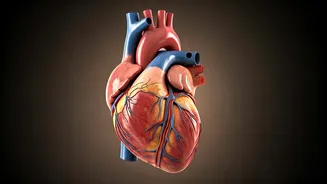Plaques: The Culprits
Plaques within arteries, a significant issue, represent a buildup of substances such as cholesterol, fat, and calcium. These plaques accumulate along the
arterial walls, creating blockages. These blockages narrow the arteries, restricting blood flow to vital organs. As blood flow is reduced, it deprives the heart and other critical organs of essential oxygen and nutrients, posing considerable health risks. The presence of plaque also causes the artery walls to harden and lose flexibility, making it even more difficult for blood to pass through. The initial stages of plaque formation may be symptom-free. However, as the plaque grows, it can lead to symptoms like chest pain (angina), shortness of breath, and fatigue, all indicating potential heart problems. Furthermore, these plaques are prone to rupture. When they rupture, they can trigger blood clots that completely block the artery, resulting in a heart attack or stroke. Addressing plaque formation early through lifestyle modifications and medical intervention is key to safeguarding heart health.
Reversing the Damage
While complete reversal of arterial damage is complex, there are several steps that can slow progression and stabilize the condition. Lifestyle changes form the cornerstone of this process. A heart-healthy diet low in saturated and trans fats, cholesterol, and sodium is crucial. Regular exercise, at least 150 minutes of moderate-intensity or 75 minutes of vigorous-intensity physical activity per week, helps to improve cardiovascular health, lower cholesterol levels, and manage weight. Quitting smoking is one of the most effective steps for reversing damage, as smoking damages blood vessels and accelerates plaque buildup. Managing stress through techniques like meditation, yoga, or deep breathing exercises is also vital, as chronic stress can elevate blood pressure and worsen heart conditions. In addition to lifestyle changes, medical interventions such as medication and, in severe cases, procedures like angioplasty or bypass surgery may be necessary to manage arterial plaque and related complications. It is imperative to consult with healthcare professionals. They can evaluate your condition and guide you to a suitable treatment plan.
Prevention is Key
Preventing plaque formation is the best approach to ensure heart health. Regular health screenings are essential to identify risk factors early. Blood pressure checks, cholesterol tests, and glucose tests can alert you to potential problems before symptoms appear. Adopting a heart-healthy diet is a crucial preventive step. This involves eating plenty of fruits, vegetables, whole grains, and lean proteins, while limiting saturated and trans fats. Engaging in regular physical activity is equally important. Aim for at least 30 minutes of moderate-intensity exercise most days of the week. Avoiding tobacco use is another critical preventive measure, as smoking significantly increases the risk of heart disease. Managing stress through techniques like mindfulness, meditation, or spending time in nature is also beneficial. Taking these steps and maintaining a healthy weight can significantly reduce your risk of developing arterial plaque and other heart-related conditions. Early intervention can make a world of difference. It's best to maintain a proactive approach and consult your doctor for personalized advice.















